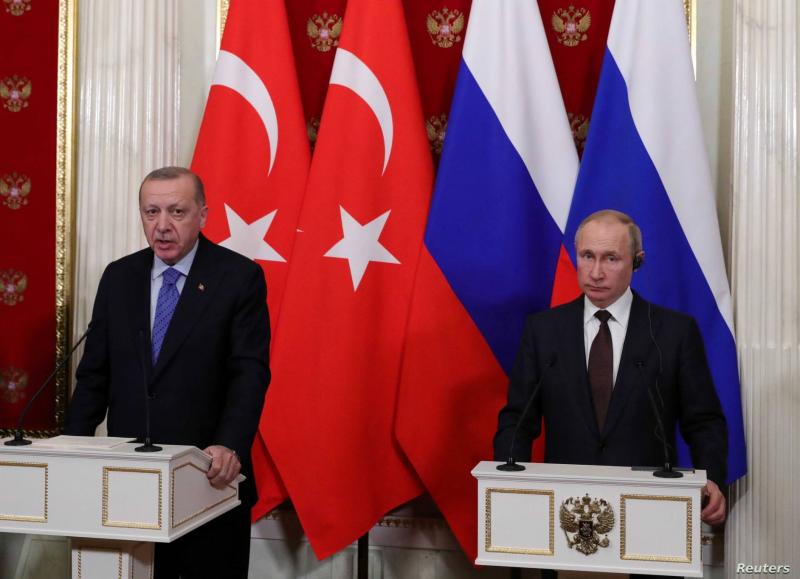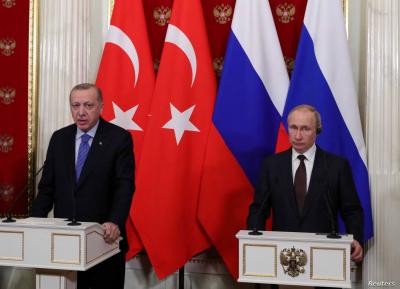The summit held between Russian President Vladimir Putin and Turkish President Recep Tayyip Erdoğan in the Black Sea resort of Sochi on Monday focused on discussing the possibility of reviving the grain agreement via the Black Sea. While the talks addressed overcoming obstacles, Erdoğan stated that there is potential for a breakthrough soon, and his Russian counterpart confirmed that Russia may return to the agreement if the West meets its demands.
Russia withdrew from the agreement in July after a year of its implementation, which was brokered by the United Nations and Turkey, stating that its food and fertilizer exports faced hurdles. Erdoğan had previously played a significant role in convincing Putin to adhere to the agreement and is now, alongside the United Nations, trying to persuade him to return to it.
After his first meeting with Putin since 2022 at the Black Sea resort, Erdoğan said, "From Turkey's perspective, we see that we will reach a solution that meets expectations in a short period." He added that everyone is well aware of Russia's aspirations and that shortcomings in the agreement must be addressed, indicating that Turkey and the UN have worked on a new package of proposals to alleviate Russian concerns.
Putin, for his part, stated that Russia could return to the grain agreement if the West adheres to a separate memorandum signed with the UN at the same time to facilitate the export of Russian food and fertilizers. He mentioned that Russia would reconsider the revival of the grain deal once all agreements related to lifting restrictions on Russian agricultural exports are fully implemented. He noted that Western accusations that Russia caused a food crisis after its withdrawal from the grain agreement are incorrect, as prices did not rise after that move. Putin stated, "There is no tangible shortage of food supplies."
He also emphasized that "the West continues to prevent the supply of grain and fertilizers from Russia to global markets," adding that the West deceived Russia regarding the agreement since wealthy countries received more than 70 percent of the grain exported under the agreement.
Russia and Ukraine are among the world's largest agricultural producers, playing a critical role in the markets for wheat, barley, corn, rapeseed and rapeseed oil, sunflower seeds, and sunflower oil. Putin mentioned that Russia expects its grain harvest to reach 130 million tons this year and that 60 million tons of this can be exported.
Additionally, Erdoğan stated that Ukraine needs to soften its negotiating position against Russia in discussions aimed at reviving the agreement. He told reporters after his meeting with Putin, "Ukraine should ease its approach for it to be possible to take joint steps with Russia," and called for more grain to be sent to Africa instead of European countries.
The agreement reached in the summer of 2022, under the auspices of Turkey and the UN, allowed for grain exports from Ukraine, easing global concerns about rising food prices. Turkey, a NATO member, hopes to revive the agreement in a manner that establishes more comprehensive peace negotiations between Moscow and Kyiv, relying on the relationship between Putin and Erdoğan, which has remained close despite the Russian invasion of Ukraine in February 2022.
The special relationship between Presidents Putin and Erdoğan, who have ruled their countries for nearly two decades, has allowed Ankara to maintain a balance in its relations with Moscow and Kyiv since the outbreak of the war.
Putin stated that the plan to send one million tons of Russian grain to Turkey at reduced prices for processing in Turkish factories and shipping to the most needy countries is not an alternative to the grain agreement. Erdoğan also reiterated his rejection of alternative proposals for grain export agreements, stating that they "do not constitute a sustainable and safe model based on cooperation between the parties, similar to the Black Sea Initiative." He clarified that Turkey is preparing "a new package of proposals in consultation with the United Nations" aiming to revive the vital agreement for global food supplies.




